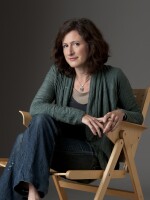After 29 years, Mary Hart is stepping down as host of the CBS show Entertainment Tonight – presumably with those legs once insured for a million dollars each. It's television's longest-running entertainment show, and Hart's been with it almost since the beginning. She helped create a kind of news that, like it or not, has come to permeate the culture.
Before Entertainment Tonight, regular folks weren't expected to be interested in the industry side of the entertainment industry.
"We were the first ones to talk about television ratings and box office grosses over the weekend," Hart pointed out during our interview inside her pastel-colored bungalow near ET's Studio 4 on the Paramount Lot. Now, that kind of news is just part of regular mainstream coverage.
If you read old interviews with Mary Hart, as with many celebrities, the same stories tend to crop up over and over. Mary Hart's been a dominant force in entertainment news for almost thirty years, so naturally, many of her stories are about interviewing celebrities.
That's why I decided not to ask her about her favorite celebrity interviews. It felt deeply boilerplate. Plus, I'd read about them all already. Her private dinner with the ever-so-shy Michel Jackson. Her tête- à-tête with Annette Funicello after the latter's diagnosis of MS. Her chats with other ailing celebrities, including Richard Pryor and Christopher Reeve.
But Mary Hart is so accustomed to talking about her favorite interviews, she went ahead and told me about one anyway. One I hadn't heard before. And it was such a good story, I couldn't resist putting it on the air.
"She was such a dear lady, she was already 91 years old," Hart exclaimed about the venerable stage actress Helen Hayes. "I was sitting in her living room, we had all of our lights and everything set; it was quite the setup in this charming little old lady's house. And all of a sudden one of the lights stands fell. Hit. Her. On. The. Head. She falls over onto her sofa and I'm sitting there going, 'Oh my gosh! We just killed Helen Hayes!'"
This is what makes Mary Hart impressive. She chose a great anecdote that she knew NPR's audience would appreciate. No wonder she's flourished in an industry often unkind to aging ladies. (Helen Hayes being another rather obvious exception.) Anne Helen Petersen, an academic who's studied the gossip industry and the rise of entertainment, says ET was smart to hang onto Hart.
"This is the 34-60 audience, this is really her prime demographic," Petersen observed of the age of the show's audience. "Mostly women, middle class."
For those women, Hart provided a likeable bridge to the stars. She combines former beauty-queen glamour with a goofy, self-deprecating sensibility that Hart herself defines as Midwestern. When I asked her if her persona took work, she was startled. "Golly! No! It's not work at all." She was equally affable when I wondered if she felt that ET bore any responsibility for creating an appetite for celebrity news that's resulted in obsessive stalkerazzi and the aggressive media entity TMZ.
"I think there is a meaner tone, and I don't just see it in entertainment news. It's just ... in general," she pointed out.
As Entertainment Tonight's backstage access and sneak previews are being supplanted by mean, lean multimedia formats, its audience is slipping away. (By around two million viewers over the past ten years, according to figures provided to NPR by the Nielsen Company.) As Mary Hart exits, for the last time, the blinking orange stage that set up a shift in American news programming, it is indeed the end of an era.
Copyright 2020 NPR. To see more, visit https://www.npr.org. ![]()




